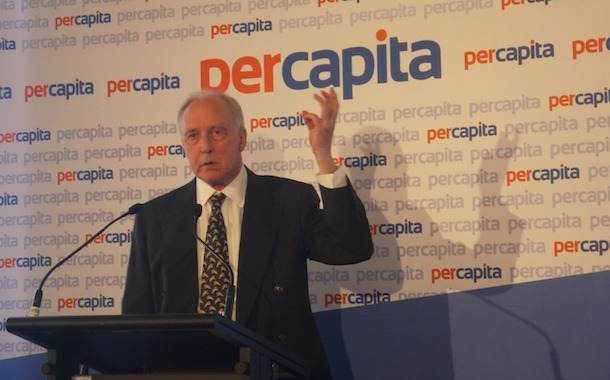ABOUT CAPPA

The Centre for Applied Policy in Positive Ageing (CAPPA) is the ‘do tank’ of Per Capita’s think tank.
As the ‘do tank’, CAPPA undertakes social innovation projects that focus on finding solutions to emerging issues resulting from Australia’s ageing population, aiming to increase the social and economic wellbeing of older Australians. Through its social innovation projects, CAPPA harnesses ageing as an opportunity for Australian society by catalysing policy innovation.
We achieve this purpose in multiple ways:
- Develop innovative and original social innovation projects, underpinned by rigorous research;
- Test social innovation projects in the field and prepare them for scaling;
- Conduct original ageing related public policy research;
- Champion positive ageing by reframing the public debate; and
- Influence policy makers and practitioners to ensure long-term strategic change.
THE CAPPA APPROACH
CAPPA PROJECTS
Money For Jam: Enabling women over 50 at risk of poverty to create financial wellbeing through microenterprise
One third of older women in Australia live in permanent income poverty. This is a damning statistic for one of the richest countries in the world.
Older women are particularly vulnerable financially for a variety of social and structural reasons, including a lack of appropriate employment services, pervasive age and gender discrimination, family breakdown and interrupted careers due to child-raising and other caring responsibilities.
Although microenterprise is often promoted as an option for income generation for the long-term unemployed, through the New Enterprise Incentive Scheme (NEIS) for example, many older women do not identify with what they see as the masculine world and language of business. Yet their life experience demonstrates resilience and resourcefulness that may translate well into small business ownership with the right amount and type of guidance.
Money For Jam is an innovative pilot project supporting 50+ women at risk of income poverty. Co-designed with older women experiencing disadvantage and homelessness, Money For Jam responds to entrenched gender disadvantage by helping women identify the skills and the confidence to earn extra income through microenterprise.
CAPPA PROJECTS
Money For Jam update
December 2018 saw the completion of Per Capita’s flagship social innovation project Money For Jam. Generously funded by Equity Trustees and Gandel Philanthropy, with further support from Lord Mayor’s Charitable Foundation, Melbourne Women’s Fund and Reichstein Foundation, Money For Jam engaged with more than 40 older women to empower them to earn through microenterprise.
Working with Women’s Housing Ltd, Fitted for Work and En Masse, we delivered both class-based learning and a smartphone app program, supporting women to learn small business skills and tools to grow their confidence, using positive psychology, mentoring and peer support networks.
Evaluation from Brotherhood of St Laurance shows 54% of women who completed the year-long program had either started a microenterprise, or are currently developing a microenterprise. Ideas for businesses reflect the diverse skills and interests of older women. They range from organic cleaning products, to a home tutoring service for school-age children, and even trauma therapy.
The program is designed to help women at different stages of business knowhow and the pilot attracted interest from across Australia, although the delivery was Melbourne-focused. MFJ has a dual emphasis on increasing older women’s earning capacity but also their psychological wellbeing. Co-designed with older women, the MFJ model seeks to address low self-esteem and business confidence in older women, as well as the significant financial disadvantage many older women face.
The Brotherhood of St Laurence evaluation recorded over half of the participants involved the pilot were in receipt of disability support pension, with a number of other on welfare payments or casualised, insecure employment.
While it was too early to see significant improvements in income for women, BSL recorded substantial improvements in participants’ psychological wellbeing.
With support from the Reichstein Foundation, participants in the program made their own digital story about Money For Jam: you can see their short video to the right. Into the future, Per Capita hopes to progress the suggestion of one of our younger participants, to build a subscriber/member-based Money For Jam. Continuing our smartphone app with En Masse and in partnership with Council of Single Mothers and their Children, we hope to scale Money For Jam into a successful membership-based model, supporting single mothers in additional to older women.
Emerging Ageing: Co-designing responses to positive ageing for new and emerging migrant communities
The focus of this Emerging Ageing project was to understand what ‘positive ageing’ means to older Victorians from new and emerging communities and to eliminate barriers to accessing ageing and aged care services.
ECCV and Per Capita undertook a co-design initiative, linking previous research with contributions from community members themselves. During the co-design process, we learnt that a surprising number of seniors from new and emerging communities were open to receiving aged care services that support their continued independence. On the other hand, there was a marked lack of confidence and lack of ability to navigate the aged care service system.
This Emerging Ageing project report offers two innovative co-design models and a number of key recommendations to support Government planning and influence decision-makers to drive positive ageing outcomes for new and emerging communities.
Co-care Design:
CAPPA’s most recent project is a co-design research project focusing on older women without financial assets, in need of age-supported accommodation. The project will explore new housing models, new care pathways, and new financial models from the community perspective.
